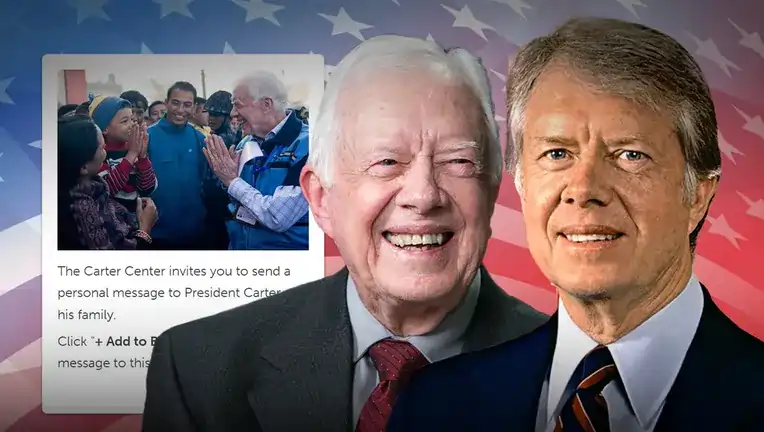Celebrating the Legacy of Jimmy Carter: Humanitarian, Statesman, and Global Leader

The world bids farewell to Jimmy Carter, a man whose extraordinary life spanned a century and whose contributions touched every corner of the globe. From his tenure as the 39th President of the United States to his tireless humanitarian work through the Carter Center, Carter leaves behind a legacy of compassion, leadership, and unwavering commitment to peace and human dignity.
ADVERTISEMENT

Early Life and Naval Service
Born on October 1, 1924, in Plains, Georgia, James Earl Carter Jr. grew up in a close-knit community where his family instilled in him the importance of faith, hard work, and service to others. His father, a farmer and businessman, and his mother, a registered nurse, played pivotal roles in shaping his character. Carter’s early experiences helping on the family farm and witnessing the struggles of rural families deeply influenced his lifelong commitment to equality and justice. A graduate of the U.S. Naval Academy, Carter served as a submariner in the U.S. Navy, where he honed the discipline and leadership skills that would later define his political career.
Political Career: A Visionary Leader
Jimmy Carter began his political journey as the Governor of Georgia (1971–1975), where he championed civil rights and government transparency. During his tenure, he implemented policies to desegregate state agencies, reformed the state government to make it more efficient, and advocated for improved education and healthcare programs to address systemic inequalities. In 1977, he ascended to the presidency, bringing a focus on human rights, environmental conservation, and energy independence.
Key Achievements:
- Camp David Accords: Carter’s negotiation of peace between Egypt and Israel remains one of the most significant diplomatic achievements in modern history. The 13-day summit at Camp David in 1978 brought together Egyptian President Anwar Sadat and Israeli Prime Minister Menachem Begin, resulting in a groundbreaking peace treaty. Carter’s persistence, empathy, and ability to mediate under immense pressure helped overcome deep-seated tensions and laid the foundation for a lasting, albeit fragile, peace in the region.
- Energy Policy: Amid an energy crisis, Carter promoted renewable energy and conservation, laying the groundwork for today’s sustainability efforts.
- Human Rights Advocacy: His foreign policy placed human rights at the forefront, influencing global relations.
The Carter Center: A Legacy of Service
After leaving the White House, Carter’s commitment to public service continued through the establishment of the Carter Center in 1982. The nonprofit organization has become a beacon for global peace and health initiatives.
Major Contributions:
- Eradication of Guinea Worm Disease: The Center’s efforts have nearly eradicated this debilitating disease through a combination of community-based interventions, education, and partnerships with organizations like the World Health Organization and local governments. By providing clean drinking water, distributing filtering tools, and fostering international collaboration, the Carter Center effectively reduced cases from millions annually in the 1980s to fewer than a handful today.
- Election Monitoring: Promoting democracy through the observation of elections worldwide.
- Habitat for Humanity: Carter and his wife, Rosalynn Carter, were hands-on volunteers, building homes for those in need.
Nobel Peace Prize and Global Recognition
In 2002, Carter was awarded the Nobel Peace Prize for his decades-long efforts to resolve conflicts, advance democracy, and promote human rights. This accolade cemented his status as a global statesman whose influence extended far beyond his presidency.
Personal Life and Values
Carter’s partnership with Rosalynn Carter was the cornerstone of his life. Together, they raised four children and dedicated themselves to improving the world. Known for his faith, Carter often taught Sunday school in Plains, Georgia, exemplifying his lifelong devotion to community and spirituality.
Reflections and Tributes
Leaders worldwide have paid tribute to Carter’s legacy. President Joe Biden praised him as a “man of principle and humility,” while former President Barack Obama reflected on Carter’s unwavering commitment to justice and service. United Nations Secretary-General António Guterres described Carter as “a tireless advocate for peace and the betterment of humanity,” while Canadian Prime Minister Justin Trudeau highlighted his “remarkable contributions to democracy and human rights.” These sentiments underscore Carter’s global impact and enduring inspiration. Organizations like the United Nations have acknowledged his enduring contributions to global peace.
Conclusion
Jimmy Carter’s life was a testament to the power of empathy, resilience, and service. As the world mourns his passing, it also celebrates a legacy that will inspire generations to come. From Plains, Georgia, to the global stage, Carter’s impact will forever remind us of the enduring strength of integrity and compassion.
Disclaimer
This article is a tribute to the life and legacy of Jimmy Carter and aims to provide accurate information based on publicly available sources. Visit Net Trends for more insights and updates. The inclusion of hyperlinks is for informational purposes and does not imply endorsement.
ADVERTISEMENT


Devin is a feature writer with 10 years of experience creating captivating stories across lifestyle, culture, business, and technology. Known for meticulous research and vivid narratives, Devin brings unique perspectives to every piece, ensuring it resonates with diverse audiences.








